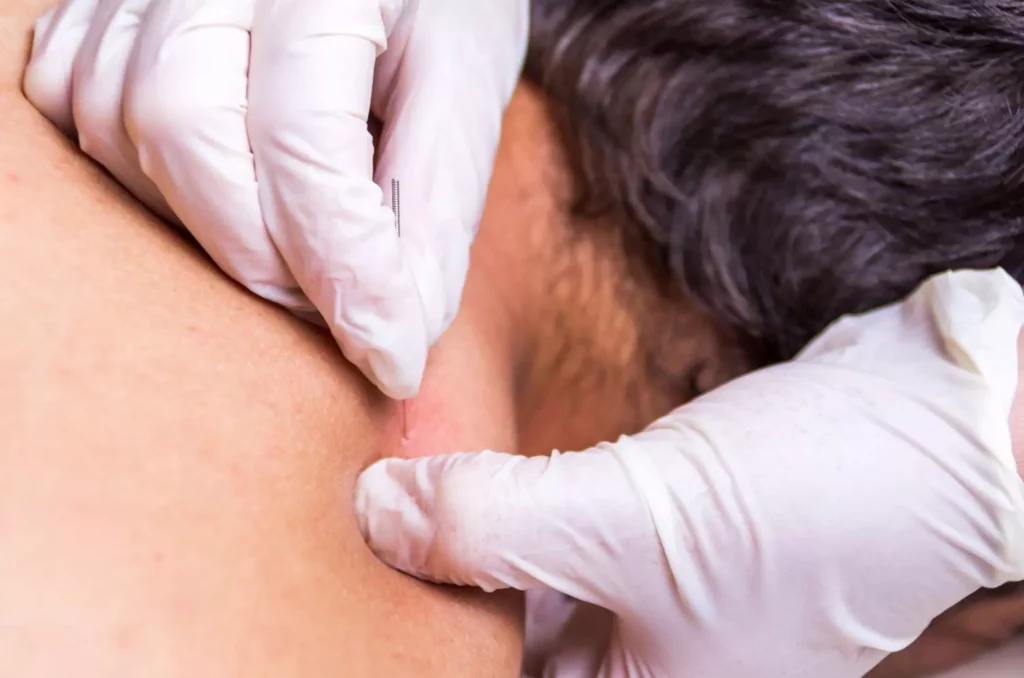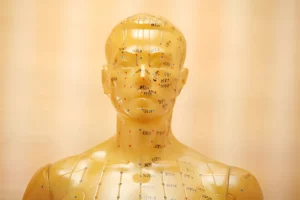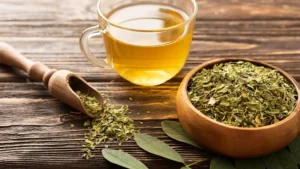How Does Dry Needling Work?
Tight, sore areas called trigger points can form in your muscles. These trigger points are very sensitive and can hurt when touched. Sometimes, a trigger point may be close to where your pain is. But they often cause referred pain as well. Referred pain is pain that feels like it’s coming from another part of your body. What is dry needling? Dry needling involves inserting thin needles into trigger points or tight muscles to alleviate pain and improve range of motion.
It targets myofascial trigger points, releasing tension and promoting muscle relaxation. The needles stimulate a twitch response, causing muscles to reset and relieve discomfort. This process increases blood flow and promotes the body’s natural healing mechanisms. While similar to acupuncture, dry needling focuses on muscular issues and doesn’t necessarily follow traditional energy meridians. This technique is commonly used in acupuncture to address musculoskeletal pain and dysfunction. Always seek a qualified practitioner for dry needling procedures.
Does Dry Needling Hurt?
Dry needling may cause mild discomfort during insertion, often described as a quick pinch or cramping sensation. However, the discomfort is typically brief, and many individuals report feeling immediate relief after the procedure. Sensations can vary depending on the individual’s pain threshold and the area being treated.
Read Also: What is Trigger Point Release and What to Know About it
What Kind of Needles Are Used?
Needles are typically made of stainless steel and are designed to penetrate the skin and target specific trigger points or tight muscles. The needles used in dry needling are different from hollow hypodermic needles used for injections. They are specifically chosen for their ability to reach deep tissues and elicit a twitch response to release muscle tension. The size and thickness of the needles may vary based on the area being treated and the practitioner’s preference.
Who Shouldn’t Get Dry Needling Treatments?
Dry needling procedure, while beneficial for many, may not be suitable for everyone due to certain considerations and contraindications:
- Needle Phobia. Individuals with an extreme fear or anxiety surrounding needles may find dry needling challenging and uncomfortable, potentially hindering the effectiveness of the treatment.
- Hemophilia or Bleeding Disorders. People with blood clotting disorders or those on anticoagulant medications have an increased risk of bleeding or bruising at the needling sites, making dry needling less advisable.
- Pregnant Women. While limited research exists on the effects of dry needling during pregnancy, caution is advised. Needling near the abdomen or lower back could potentially affect the fetus. It’s essential to consult a healthcare provider before undergoing dry needling while pregnant.
- Skin Infections or Open Wounds. Dry needling involves puncturing the skin, making it inadvisable for individuals with skin infections or open wounds at the needling sites due to the risk of exacerbation or infection spread.
- History of Seizures. People with a history of seizures or epilepsy should approach dry needling cautiously. Needling may potentially trigger a seizure in some individuals.
- Severe Medical Conditions. Individuals with severe medical conditions, such as uncontrolled diabetes, cancer, or compromised immune systems, should consult their healthcare provider before pursuing dry needling.
For an effective treatment and to avoid potential risks, it is highly advisable to consult both your healthcare provider and a licensed dry needling practitioner.
What are the Benefits of Dry Needling?
Dry needling offers several potential benefits for individuals experiencing musculoskeletal pain or dysfunction. Some of these benefits include:
- Pain Relief. Dry needling helps in reducing localized pain by targeting trigger points within muscles.
- Improved Muscle Function. By addressing trigger points and tight bands within muscles, dry needling can restore proper muscle function.
- Enhanced Blood Flow. The insertion of needles stimulates blood flow to the treated area, promoting healing and reducing inflammation.
- Management of Chronic Pain Conditions. It’s beneficial for managing chronic pain conditions such as myofascial pain syndrome, fibromyalgia, and chronic lower back pain.
- Supports Rehabilitation. When combined with other rehabilitation strategies, dry needling assists in facilitating a more effective recovery from injuries or surgeries.
- Improved Athletic Performance. Athletes often use dry needling to address muscle imbalances, promote recovery, and enhance athletic performance.
- Minimized Dependency on Medications. For some individuals, dry needling can reduce the need for pain-relieving medications by addressing the root cause of musculoskeletal pain.
Note that individual responses may vary.
Read Also: Top 10 Benefits of Acupuncture
What are the Potential Side Effects of Dry Needling?
While generally safe, dry needling, like any medical intervention, may present certain potential side effects
- Soreness or Discomfort. After the procedure, it’s common to experience soreness or mild discomfort at the needling sites. This sensation typically subsides within a day or two.
- Bruising or Bleeding. Occasionally, bruising or minimal bleeding may occur at the insertion sites. This risk is higher for individuals with bleeding disorders or those taking blood-thinning medications.
- Fatigue or Lightheadedness. Some individuals might feel fatigued or lightheaded after dry needling, particularly during the first session. This feeling usually dissipates shortly after treatment.
- Temporary Increase in Pain. In some cases, there might be a temporary exacerbation of pain or muscle spasm immediately after dry needling. This reaction typically resolves quickly.
- Risk of Infection. Although rare, there’s a minimal risk of infection at the needling sites. Ensuring proper hygiene and using sterile needles can significantly reduce this risk.
- Nerve Irritation. While uncommon, there is a slight risk of unintentionally irritating nearby nerves during needling, leading to temporary numbness, tingling, or muscle weakness.
- Adverse Reaction. Individuals may experience an adverse reaction, such as dizziness or nausea, particularly if they are sensitive to the treatment or have a low tolerance for needling sensations.
It’s essential to communicate any concerns or adverse reactions to your healthcare provider.
At Pulse Acupuncture, our holistic approach integrates acupuncture into comprehensive strategies. At our acupuncture clinic we use personalized treatments that fit your individual needs.
Read Also: Sports Acupuncture for Athletes: Boosting Performance and Recovery
Dry Needling – FAQ
What Does Dry Needling Do?
Dry needling is a therapeutic technique where thin needles are inserted into specific points of the muscle, known as trigger points. This helps alleviate muscle pain and stiffness, improve flexibility, and increase blood flow, effectively targeting localized muscle tension and enhancing overall muscle function.
Does Dry Needling Work?
Yes, dry needling can be effective in treating muscular pain and tightness. It targets trigger points to release tension, reduce pain, and enhance movement. The effectiveness varies among individuals, and it is often used in conjunction with other physical therapy techniques for optimal results.
Is Dry Needling the Same as Acupuncture?
No, dry needling and acupuncture are not the same. Dry needling is primarily focused on relieving muscle pain and tightness by targeting trigger points within the muscles. Acupuncture, on the other hand, is based on traditional Chinese medicine principles and aims to balance the body’s energy flow by stimulating specific points along energy pathways. Both use thin needles but have different underlying philosophies and treatment goals.
Is Dry Needling Painful?
Dry needling can cause some discomfort, often described as a brief muscle cramp or twitch when the needle is inserted into a trigger point. The sensation typically subsides quickly, and many patients experience significant relief from muscle pain and tightness following the treatment.
Is Dry Needling Safe?
Yes, when performed by a trained and licensed professional, dry needling is safe. It involves minimal risk, particularly when strict hygiene protocols are followed. Common side effects are mild and can include temporary soreness or bruising at the needle sites.
-
Marina Doktorman, M.S., L.Ac., is an experienced acupuncturist who obtained her Masters of Acupuncture from the Tri-State College of Acupuncture in New York City in 2001. During her studies, she focused on Chinese Herbology, a branch of Traditional Chinese Medicine (TCM) that utilizes herbs to complement acupuncture treatments. Marina is licensed in both New York (NY) and New Jersey (NJ) and holds a Diplomate of Acupuncture from the National Certification Commission for Acupuncture and Oriental Medicine (NCCAOM), indicating her expertise in the field.







